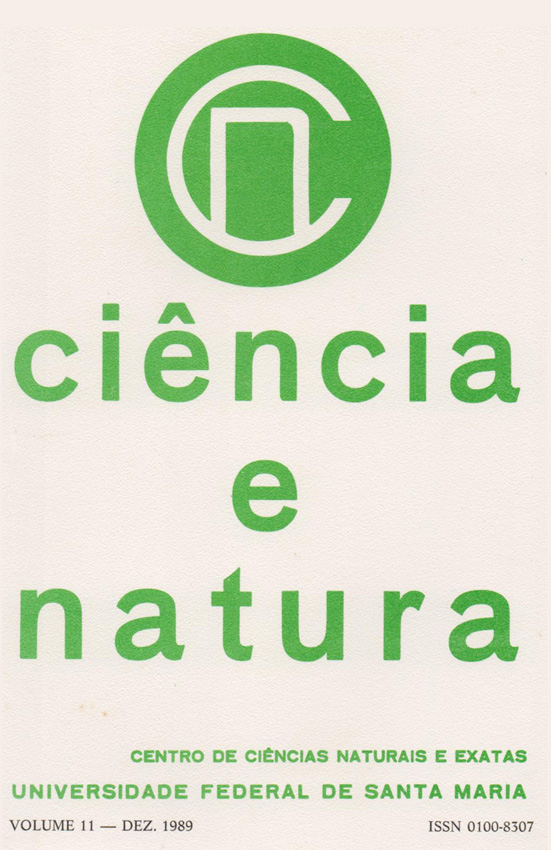Efeitos do sombreamento em mudas de Cabralea glaberrima Juss. sob condições de viveiro
DOI:
https://doi.org/10.5902/2179460X25554Resumo
No viveiro do Departamento de Ciências Florestais, da UFSM, Santa Maria - RS, foi analisado o desenvolvimento de mudas de canjerana (Cabralea glaberrima), sob 0,25,50,70 e 80% de sombreamento. O experimento foi instalado em campânulas de 1,50m X 1,0m X 0,70m de comprimento, altura e largura, respectivamente, com armação de ferro, coberturas com tela plástica com diferentes níveis de sombreamento, envolvidas lateralmente com a mesma tela, em três repetições e 30 indivíduos por parcela. Após 12 meses avaliadas suas alturas finais, diâmetro de colo e produção da matéria seca, quando foi observado uma altura estatisticamente superior em mudas sob 70% e 80% de sombreamento. Iguais resultados foram obtidos para a produção de matéria seca total nos referidos níveis, influenciada por uma maior produção de matéria seca da parte aérea, significativamente superior aos demais tratamentos. Para o diâmetro de colo, não houve diferença significativa entre os tratamentos.
Downloads
Referências
ALENCAR. J.C .. & ARAUJO. V.C. Comportamento de Espécies Florestais Amazônicas quanto a Luminosidade. Manaus. Acta Amazônica. 10 (3):435-444.1980.
ANDRAE. F.H. Ecologia Florestal. Santa Maria. U.F.S.M. Departamento de Ciências Florestais. 1978. 228 p.
FERREIRA. M.G.; CÂNDIDO. J.F.; CANO. N.A.O. & CONDE, A.R. Efeito do Sombreamento da Produção de Mudas de Quatro Espécies Florestais Nativas. Viçosa. REV. ÁRVORE. V.1 (2) 121-134. 1977.
FERREIRA. M.G.; CÂNDIDO. J.F.; SILVA. D.A. & COLODETTE. J.L. Efeito do Sombreamento e da Densidade de Sementes sobre o Desenvolvimento de Mudas de Pinus insularia Endlicher e seu Crescimento Inicial no campo. Curitiba. REV. FLORESTA. 12 (1):56-61. 1981.
GOMES. S .M.; FERREIRA. M. G.M.; BRANDI, R.M. & NETO, F. P. Influência do Sombreamento no Desenvolvimento de Eucaliptus grandis W. Hill ex Maiden. Viçosa. REV. ÁRVORE, V.2 (1):68-75. 1978.
FONSECA, A.G.; BRANDI. R.M.; PAUL A NETO, F. & CÂNDIDO, J.F. Efeito do Sombreamento, Tamanho e Peso de Sementes na Produção de Mudas de E. grandis W. Hill ex Maiden e no seu Crescimento Inicial no Campo. Viçosa. REV. ÁRVORE. V.3(2):145-149. 1979.
JESUS, R.M.; LOGISTER, F. & MENANDRO, M.S. Efeito da Luminosidade e do Substrato na Produção de Mudas de Cordiatrichotoma (VEll) Arrab., In: VI CONGRESSO FLORESTAL ESTADUAL, V.1. Nova Prata. 1988. p:459-469.
OLIVEIRA, O.S. A andiroba (Carapaguianensis) e seu Comportamento Silvicultural em Diferentes Intensidades de Luz. In: I CONGRESSO BRASILEIRO DE FLORESTAS TROPICAIS. Viçosa. Universidade Federal de Viçosa. 1974. p:579-590.
STURION. J.A. & IEDE, E.D. Influencia da Profundidade de Semeadura, Cobertura de Canteiros e Sombreamento na Formação de Mudas de Ocotea porosa (Ness) Barroso. Documentos. EMBREPA/URPFCS. Curitiba. Nº 10. 1982. p:71-79.
Downloads
Publicado
Como Citar
Edição
Seção
Licença
Para acessar a DECLARAÇÃO DE ORIGINALIDADE E EXCLUSIVIDADE E CESSÃO DE DIREITOS AUTORAIS clique aqui.
Diretrizes Éticas para Publicação de Revistas
A revista Ciência e Natura está empenhada em garantir a ética na publicação e na qualidade dos artigos.
A conformidade com padrões de comportamento ético é, portanto, esperada de todas as partes envolvidas: Autores, Editores e Revisores.
Em particular,
Autores: Os Autores devem apresentar uma discussão objetiva sobre a importância do trabalho de pesquisa, bem como detalhes e referências suficientes para permitir que outros reproduzam as experiências. Declarações fraudulentas ou intencionalmente incorretas constituem comportamento antiético e são inaceitáveis. Artigos de Revisão também devem ser objetivos, abrangentes e relatos precisos do estado da arte. Os Autores devem assegurar que seu trabalho é uma obra totalmente original, e se o trabalho e / ou palavras de outros têm sido utilizadas, isso tem sido devidamente reconhecido. O plágio em todas as suas formas constitui um comportamento publicitário não ético e é inaceitável. Submeter o mesmo manuscrito a mais de um jornal simultaneamente constitui um comportamento publicitário não ético e é inaceitável. Os Autores não devem submeter artigos que descrevam essencialmente a mesma pesquisa a mais de uma revista. O Autor correspondente deve garantir que haja um consenso total de todos os Co-autores na aprovação da versão final do artigo e sua submissão para publicação.
Editores: Os Editores devem avaliar manuscritos exclusivamente com base no seu mérito acadêmico. Um Editor não deve usar informações não publicadas na própria pesquisa do Editor sem o consentimento expresso por escrito do Autor. Os Editores devem tomar medidas de resposta razoável quando tiverem sido apresentadas queixas éticas relativas a um manuscrito submetido ou publicado.
Revisores: Todos os manuscritos recebidos para revisão devem ser tratados como documentos confidenciais. As informações ou ideias privilegiadas obtidas através da análise por pares devem ser mantidas confidenciais e não utilizadas para vantagens pessoais. As revisões devem ser conduzidas objetivamente e as observações devem ser formuladas claramente com argumentos de apoio, de modo que os Autores possam usá-los para melhorar o artigo. Qualquer Revisor selecionado que se sinta desqualificado para rever a pesquisa relatada em um manuscrito ou sabe que sua rápida revisão será impossível deve notificar o Editor e desculpar-se do processo de revisão. Os Revisores não devem considerar manuscritos nos quais tenham conflitos de interesse resultantes de relacionamentos ou conexões competitivas, colaborativas ou outras conexões com qualquer dos autores, empresas ou instituições conectadas aos documentos.






